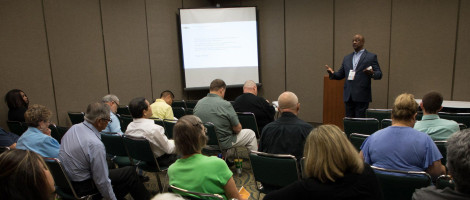How churches should intentionally plan to protect congregations
by Guest Author on September 5, 2018 in Faith

By Teresa Young, contributing writer and director of Alumni Relations at Wayland Baptist University
It’s not a topic that most churches want to even think about. But with news headlines about violent attacks becoming more prevalent, one Texas Baptists church member says churches simply must make security a high priority.
Don Simmons, a member of New Beginnings Baptist Church in Lewisville and owner of Acacia Security Management Services of Carrollton, presented a workshop on how churches can protect their people and their property during the Texas Baptists Family Gathering held in Arlington in July.
“We need to accomplish providing security without making our places of worship appear like a fortress. Churches should be welcoming, and you don’t want to distract the people from the message,” said Simmons, who leads the security ministry at New Beginnings. “The challenge is bringing two things together that are diametrically opposed: more security leads to less convenience, and more convenience means things cannot be more secure.”
While protection against violent actions that are more familiar is a common first thought, Simmons said churches should remember that threats can include everything from mass violence and crimes against people and property to natural disasters and weather situations.
Simmons shared 10 steps to creating a church security plan during the workshop, encouraging churches to have a sense of urgency toward these efforts.
-
Consider the risks. Even if nothing has happened yet, it could happen.
-
Bring together the stakeholders. Set up a meeting of the church’s ministers, deacons and key volunteer leadership and start a conversation about security.
-
Build a team. Establish a committee to oversee security and safety functions. Tap into those people who are policemen, security guards and sheriff’s officers in your church who are naturally passionate about safety.
-
Conduct a vulnerability assessment. Simmons called this the single most important thing churches can do since it helps them understand the current state of the facility. “You have to step back and look at your church through the lens of the bad guys,” Simmons said. “Consider how much crime is in your area, what type of crimes are being committed, what is there of value at your church, etc. Look at lighting, the demarcation between public and private areas, natural entry areas and flow control.” Simmons said an operational analysis includes a walk-through of what happens when the church is open, considering the number of people coming in and out, and the systems for handling cash.
-
Rank risks and prioritize probability of occurrence. Plans should include training, policies, procedures and effective control measures.
-
Create an Emergency Action Plan. This plan should address countermeasures to detect, defend or delay identifiable threats or hazards. This should logically reflect a church’s size and its unique needs.
-
Go over your plan with local law enforcement and first responders. Sharing your plan with those that would be responding to an emergency can help them be more prepared as well and shorten their response time, Simmons noted.
-
Inform the church’s insurance provider. They can assess the plan for possible liability issues, and they often offer a discount for those with a more comprehensive plan.
-
Train church leaders. Volunteers and staff should be in a position to observe the congregation and act in a crisis. Simmons stressed this as a crucial step in preparedness.
-
Pray and fast to stop violence. Simmons noted that while systems and plan are critical, prayer still works. “God gives us resources and talents to use in our time of need,” he said. “We need God’s help to know, recognize and act when necessary.”
Simmons then shared some resources from the security ministry of his church, which he helped shape as a volunteer with 30-plus years of experience in the security field. He said the church has focused on lock and key systems, electronic resources and closed circuit TV, nursery and classroom security, and training and education. He encouraged churches to not only put plans in place but also to have rehearsed evacuation plans so members create muscle memory should an incident occur.
“I can tell you what to do all day, but when you walk through it yourself, you will remember better when the time comes,” he said.
According to Simmons, the website of the Department of Homeland Security has valuable resources designed specifically for churches to provide security. He said it is critical to note that whether churches hire a security consultant or firm to design the plan or do it themselves, the important part is that it gets done.
“Church members have a reasonable right to feel safe when they gather,” he said. “As church leaders we have an inherent responsibility to protect our congregations.”
For more information on risk management and church security, contact David Adams, director of Church Administration and Special Projects, at david.adams@texasbaptists.org or call (214) 828-5253.
Texas Baptists is a movement of God’s people to share Christ and show love by strengthening churches and ministers, engaging culture and connecting the nations to Jesus.
The ministry of the convention is made possible by giving through the Texas Baptists Cooperative Program, Mary Hill Davis Offering® for Texas Missions, Texas Baptists Worldwide and Texas Baptist Missions Foundation. Thank you for your faithful and generous support.
Subscribe to receive stories like this one directly to your inbox.
We are more together.